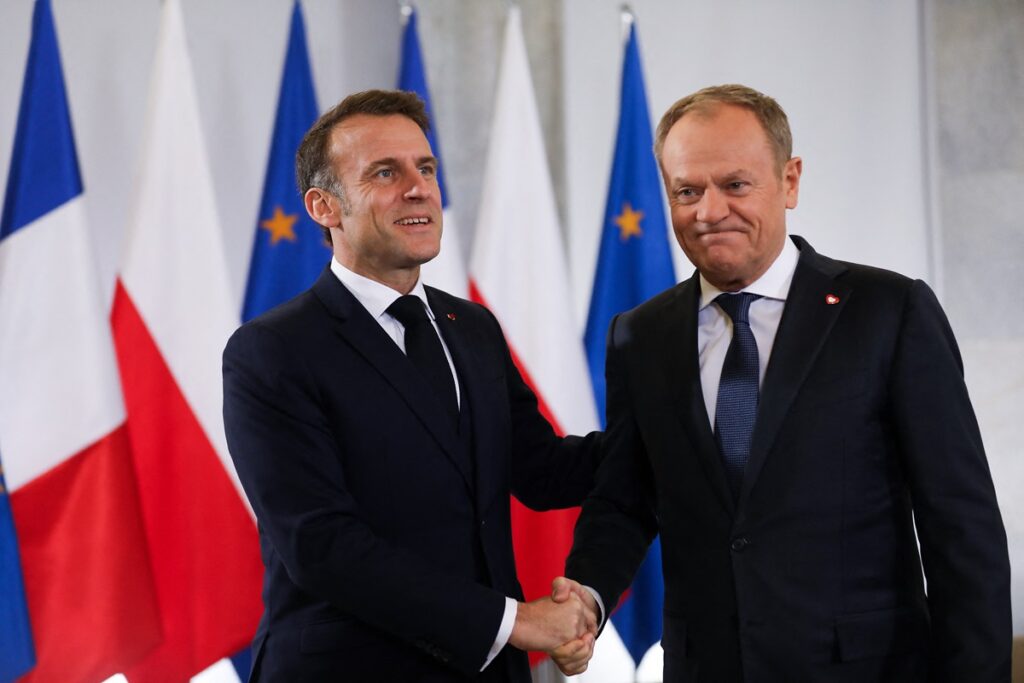Polish Prime Minister Donald Tusk on Thursday said he discussed with French President Emmanuel Macron the possibility of stationing foreign troops in Ukraine in case of a ceasefire, but that Warsaw was not currently “planning any such actions.”
Macron for his part called for a path out of Russia’s war in Ukraine — which has been raging for nearly three years — that takes into account the interests of both Kyiv and the European Union, saying the former’s sovereignty and the latter’s security were at stake.
Macron’s visit to Warsaw came days after he met in Paris with Ukrainian President Volodymyr Zelensky and US President-elect Donald Trump, who has said that solving the crisis would be his top priority when he takes office next month.
Washington is racing to bolster Kyiv amid fears Trump could try to force concessions on Ukraine to clinch a ceasefire, announcing Thursday a new $500 million package of military aid for Ukraine.
Addressing speculation about peacekeepers, Tusk said he discussed the matter with Macron.
“Any decision on Polish actions will be taken in Warsaw and only in Warsaw. For the moment, we are not planning any such actions,” he added.
In Warsaw, Macron did not publicly mention the possibility of foreign peacekeepers, but in February he floated the idea of Western troops in Ukraine.
Asked about the proposal on Monday, Zelensky said: “Frankly, we can think and work on Emmanuel (Macron)’s position.”
“He proposed that some troops of some state should be present on the territory of Ukraine to guarantee our security while Ukraine is not in NATO,” he added.
Peacekeepers Possible After Truce
EU foreign policy chief Kaja Kallas on Thursday said, “we need peace in Ukraine in order to have peacekeeping missions.”
“For that we need Russia to stop shelling, which they are not doing,” she said before a meeting of foreign ministers in Berlin.
“Before that, we have nothing to talk about. And of course, it’s to every single European country to make their decision whether they are using their troops in which processes,” she added.
German defense minister Boris Pistorius has also addressed the idea of foreign peacekeepers.
“We are preparing, we’re considering scenarios, but we are doing so in complete confidentiality,” he told public radio last week.
Trump Slams US Policy
Macron met with Zelensky and Trump on Saturday in Paris, on the US President-elect’s first international trip since his victory.
Trump slammed as a “foolish decision” the firing of American-supplied weapons deep into Russia, which has provoked angry retaliation from Moscow.
“I disagree very vehemently with sending missiles hundreds of miles into Russia. Why are we doing that?” Trump told Time Magazine, in an interview published Thursday and conducted before the Paris meeting.
Zelensky said Tuesday he was grateful for Trump’s “strong resolve” to end the war.
Washington’s newly announced military aid for Kyiv follows a $988 million security assistance package and a separate one of $725 million, both announced this month.
In Warsaw, Macron and Tusk stressed the importance of including Ukraine in any discussion on ending the war.
“No one can speak for the Ukrainians in their name regarding concessions to make… It’s up to the Ukrainians to do so, but (there can be no talk) of security in Europe without the Europeans,” Macron told reporters.
He stressed that it was important to “find a possible path that takes into account the interests of Ukraine, its sovereignty and the interests of the Europeans and their security.”
Poland, a NATO member, is a staunch backer of neighboring Ukraine and serves as a crucial logistics hub for Western military aid to Kyiv.
Warsaw has been discussing Ukraine with various foreign officials as it gears up to take over the rotating presidency of the European Union next month.
Tusk said earlier this week that Ukraine peace talks could begin “in the winter of this year.”
“Our (EU) presidency will notably be co-responsible for what the political landscape will look like, perhaps how the situation will look during (peace) negotiations,” he said.



